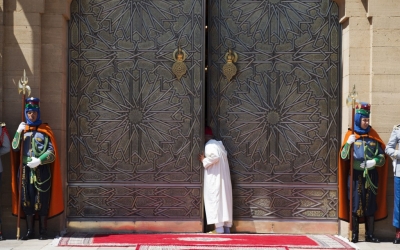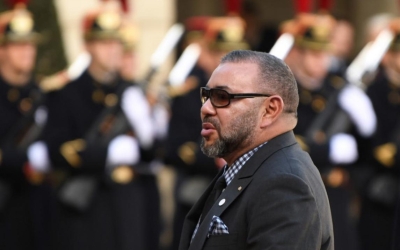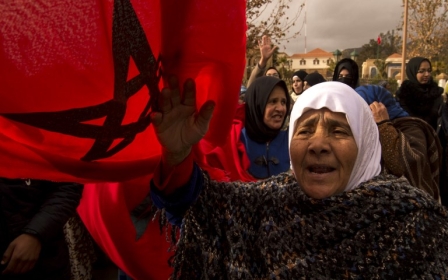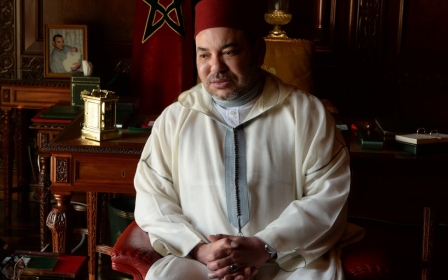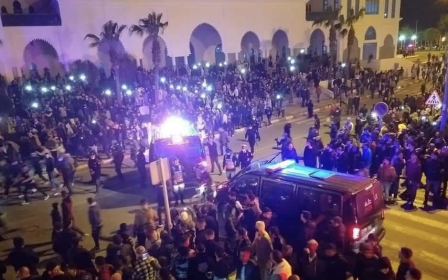Morocco: Rising social unrest should be a wake-up call for tone-deaf regime
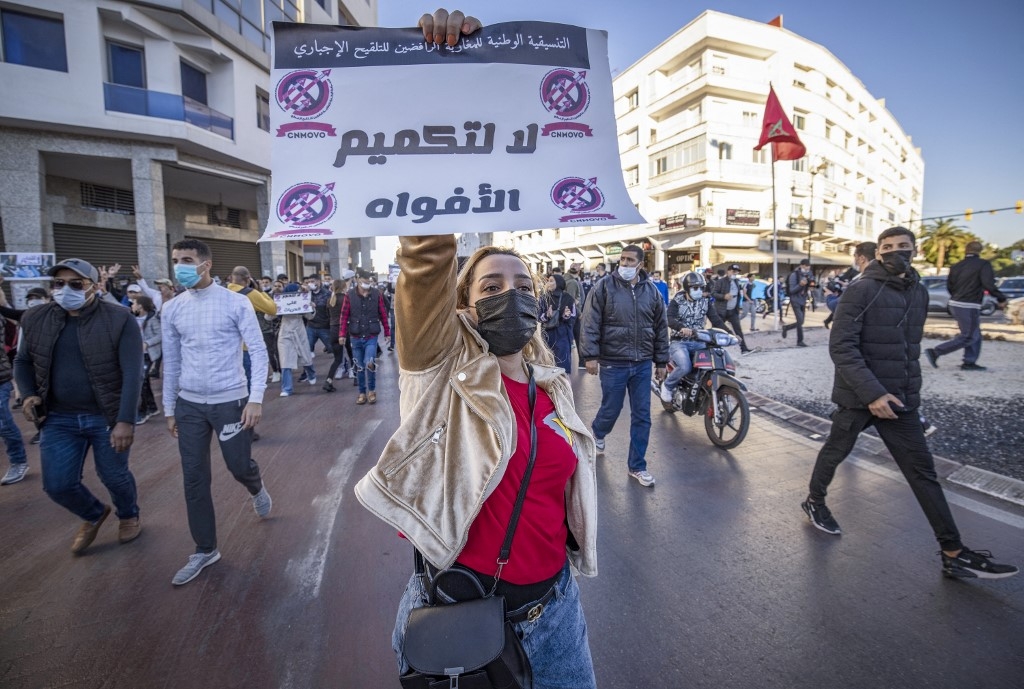
“We are being assaulted, brutalised and terrorised. They have closed everything. Electricity is too expensive, water is too expensive, everything is too expensive. My daughter has had heart disease for 27 years. No one has ever offered me a helping hand. It is too much. Good God, it is so unfair.”
A short video clip that went viral in early November shows a worn-out and weary elderly woman denouncing the difficulties of daily life in Morocco. In response to an appeal launched by social media activists, a crowd of protesters had taken to the streets in downtown Oujda in eastern Morocco, braving the cold but also the brutal repression of the regime’s security forces.
Increasingly large numbers of Moroccans are being marginalised by an indifferent regime that enjoys every luxury in life
Protesters chanted slogans denouncing the country’s imposition of a vaccine passport and the high cost of living. Soaring food prices have caused an erratic wave of unrest across the country, spurred by online activists attempting to break the law of silence by denouncing the worsening living conditions of ordinary Moroccan citizens.
The dramatic footage of the elderly woman venting her anger and indignation was a telling sign of the precarious conditions in which millions of Moroccans find themselves today.
Increasingly large numbers of Moroccans are being marginalised by an indifferent regime that enjoys every luxury in life, without lifting a finger to improve the socioeconomic conditions of the people - beyond deploying the state’s formidable propaganda machine to tout its so-called reforms.
New MEE newsletter: Jerusalem Dispatch
Sign up to get the latest insights and analysis on Israel-Palestine, alongside Turkey Unpacked and other MEE newsletters
Divorced from reality
Meanwhile, the list of the royal family’s financial imbroglios gets longer every day, with the Pandora Papers presenting the most recent example. Various groups are mobilising to express their discontent with a political system that is totally out of touch with reality.
As sit-ins and protest marches multiply across the country, the powers-that-be should take heed: popular dissatisfaction is near the boiling point. The marginalised and most vulnerable are not alone in this endeavour, as entire swaths of Moroccan society have been speaking out against government indifference and regime-led interference in public affairs.
Despite brutal crackdowns and state propaganda campaigns extolling the virtues of the Moroccan regime, the voices of the people are being raised in protest across rural areas, outlying towns and major urban hubs, including Rabat, Casablanca, Tangier and Marrakech.
Schoolteachers have turned out to condemn a newly announced age limit for the recruitment of teachers, a political gamble likely to stoke discontent among younger Moroccans who will be excluded from joining the country’s educational workforce. Lawyers and nurses have also taken to the streets in recent days to protest a number of issues, including working conditions and the vaccine passport.
The regime’s reliance on security forces to quell protests could prove counterproductive in the long run, as the government must work with an identifiable political opposition movement to negotiate a peaceful solution to the ongoing crisis. Protests that crop up in unexpected places are liable to be more explosive and unmanageable, particularly when there is neither an official organiser nor a clear set of demands.
Increasing vulnerability
The Moroccan king has never hidden his affinities with the country’s industry and business leaders. The appointment as prime minister of business tycoon and palace insider Aziz Akhannouch, which followed Morocco’s parliamentary elections in September, highlighted the palace’s increasing control over the party system. Even the slightest hopes of democratic reform in Morocco seem to have been whithered away.
The new government has been conspicuously silent since taking office, turning a deaf ear to the legitimate demands of the kingdom’s increasingly disadvantaged populations. Morocco was ranked 121st out of 189 countries on the UN Human Development Index in 2019, lagging behind occupied Palestine. Poverty in Morocco has soared since the start of the Covid-19 pandemic.
The rejection of the vaccine passport is thus a pretext for the silent majority to express its indignation over the deteriorating purchasing power of Morocco's poorer classes
The people are rightly up in arms, especially given the billions supposedly allocated to fighting poverty via programmes such as the National Initiative for Human Development, launched by the palace in 2005.
Yet, despite the growing wave of social unrest, the “government of technocrats” has not deemed it necessary to respond to public demands, even for the purposes of regaining the trust of voters. Corrupt politicians have been exempted from fiscal oversight regarding the origins of wealth accumulated during their terms in office, a clear signal that the executive branch is unwilling to take on nepotism and unlawful enrichment.
This is a dangerous game, especially considering Morocco’s lagging socioeconomic indicators, with the deficit reaching 51 billion dirhams ($5.5bn) in 2020 and unemployment among recent graduates reaching 20 percent this year. The worsening socioeconomic crisis will fan the flames of popular discontent, particularly given the high cost of living.
The rejection of the vaccine passport is thus a pretext for the silent majority to express its indignation over the deteriorating purchasing power of Morocco’s poorer classes, as well as the narrowing of the democratic space in the kingdom.
Radical opposition
The government’s chosen course of action will only worsen social inequalities and lead to the radicalisation of opposition. Fringe political groups are already making the most of the situation, including Al Adl Wa Al Ihsane, an Islamist group that never misses an opportunity to chastise the regime’s authoritarian leanings and to denounce the concessions of the Justice and Development Party (PJD).
In November, the Movement for Unity and Reform, the PJD’s ideological branch, also attacked the regime, pointing to the shrinking of democracy and freedoms. Leftist party Annahj Adimocrati did the same, denouncing the deterioration of rights and freedoms in Morocco - starting with the much-decried vaccine passport.
The drastic narrowing of freedoms in Morocco will no doubt lead to more social unrest in remote regions of the country, where security forces are less prevalent than in urban areas.
Thus, the regime’s overtures to the former head of government, Abdelilah Benkirane, after the PJD’s landslide electoral defeat, come as no surprise. This is yet another attempt by King Mohammed VI to secure the services of a weakened opposition party, faced with a government of technocrats directly under palace orders.
The question is whether the tenuous balance orchestrated by the palace can withstand Morocco’s latest season of discontent.
The views expressed in this article belong to the author and do not necessarily reflect the editorial policy of Middle East Eye.
This article was translated and condensed from the MEE French edition.
Middle East Eye delivers independent and unrivalled coverage and analysis of the Middle East, North Africa and beyond. To learn more about republishing this content and the associated fees, please fill out this form. More about MEE can be found here.



